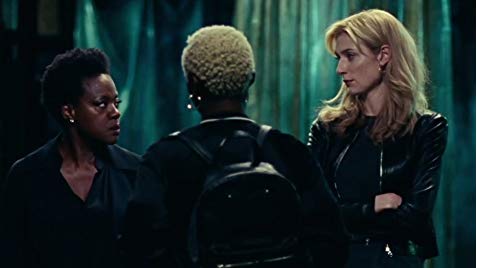With the directing power of Steve McQueen (12 Years A Slave, Shame), and the writing talent of Gillian Flynn (Gone Girl), Widows was a film I had been strongly anticipating for a while, and that anticipation was certainly fulfilled. This is a movie which ties components of a heist thriller and a political drama effectively and enjoyably into one. Oscar season has begun, and has begun with a bang.
Widows, which is loosely based on Lynda La Plante’s novel and TV series of the same name, follows four women who are widowed after their criminal husbands are killed in a failed robbery. A great debt is left behind, owed to one of the prominent politicians of Chicago, and the widows decide to take chaos into their own hands.
On first glance, Widows is an epic heist movie with bold action sequences and gripping tension. And it does in fact tick these boxes successfully. McQueen’s close-angle shooting in the moments of action really throws the viewer into the scene, engulfing them into the adrenaline-fuelled set pieces. The opening sequence drops you right in at the deep end, and the car chase that ensues keeps you on the edge of your seat as you follow the attempted escape of the criminal gang.
What lies past this however is where the film’s strengths really lie: Widows is a political commentary on the current state of race relations and segregation in America. Between each bold action scene is the ongoing race for mayoral election between Jack Mulligan (Colin Farrell), a wealthy and privileged man who cares little for real change, and Jamal Manning (Brian Tyree Henry), who is looking to become the first African-American elected in the area. This conflict underpins the whole story, and seeks to give the audience an insight into how greed and wealth continue to overshadow every aspect of American politics. McQueen tackles this theme with emotion-fuelled dialogue that encapsulates the state of political affairs regarding race and poverty as they stand in the present day, without the need for falsified hyperbole. It is this that left the greatest impact on me after I’d left the cinema, with many compelling questions to linger over.
Lots of the credit here is owed to the brilliant performances, most notably from Viola David and Daniel Kaluuya, who is seemingly hopping from one great role to the next. The only fault in the acting lies pedantically in Colin Farrell’s North-Eastern accent, which has trickles of his Irish pronunciations seeping in throughout the film. As always, the great Hans Zimmer delivers a splendid score to accompany both the thrilling tension and calmer scenes, which only adds to the tone set strongly by the cast and direction.
There are only a few problems with this film, but they do detract from it quite strongly in places. Most notably, after a fast-paced first act, the film really slows to a halt in the middle. This is a little distracting, as it seems for a moment to lose its sense of direction and the sub plots become a little confused. Some scenes here should have been shortened or cut entirely, as the engaging start the film is unfortunately lost. However, once the film picks up the pace again, the viewer is put right back in the front seat and a fantastic final act proceeds. Another issue is that the film ends with a few big unanswered questions concerning multiple characters: though it could be argued that it is up to the viewer to decide how the fate of some characters turns out, I think that Widows should have set firmer conclusions to complete the story.
Widows is a heist movie that shines above the rest due to its alternative approach to the genre – focusing not on the heist itself, but on the world going on around the action and how each character has come to be where they are. With both nail-biting thrills and thought-provoking themes, there is something in Widows for everyone to enjoy, and it is certainly one to look out for in the upcoming awards season.
Rory Yeates

